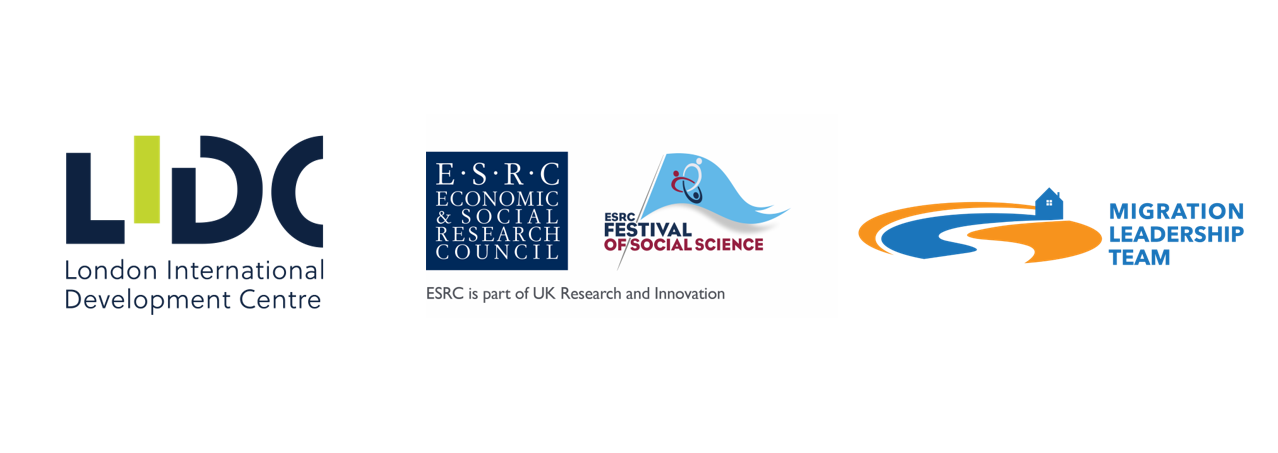How can we solve the “global migration crisis”?

Since an influx of refugees from Syria and other countries in the Middle East and Africa to the European Union dominated global headlines in 2015, the question of how best to deal with migrants and asylum seekers has dominated continental politics. While there are fewer migrants arriving illegally in the region, anti-migration political rhetoric has increased, emboldening hardliners such as Hungary’s Viktor Orban. However conversations around migration tend not to be informed by evidence about the real drivers and impacts of this challenge. In response, the London International Development Centre (LIDC) will hold a public debate on potential solutions to the ongoing global migration crisis. We will look in particular at the LIDC Migration Leadership Team’s (MLT) work to create a global strategy for migration research.
Our speakers, who include academics, development practitioners and policy makers, will also take questions from the audience. A moderator will guide the discussion, and there will be a chance to continue the conversation after the debate at a networking reception. What’s more, there will be an interactive exhibition on the topic in the same space as the debate, which will feature posters, comics, videos and activities on migration.
This event forms part of the 17th annual Festival of Social Science, which takes place from 2-9 November 2019 with over 470 events nationwide. Run by the Economic and Social Research Council, part of UK Research and Innovation, the festival provides an opportunity for the public to meet some of the country’s leading social scientists to discover, discuss and debate how research affects their lives. With a range of creative and engaging events going on across the UK, there’s something for everyone including businesses, charities, schools and government agencies.
The full programme is available at: esrc.ukri.org/festival. Catch up and join in on Twitter using #ESRCFestival.
About the speakers:
Prof Laura Hammond, SOAS University of London
Laura is an anthropologist (PhD University of Wisconsin-Madison), her research interests include food security, conflict, forced migration and diasporas. She is Challenge Leader for Security, Protracted Conflict, Refugees and Forced Displacement for the Global Challenges Research Fund, Head of the London International Development Centre's Migration Leadership Team, and Team Leader for the Research and Evidence Facility (Horn of Africa Window) of the European Union Trust Fund for Africa. She also is Chair of the Independent Advisory Group for Country Information. She has worked in the Horn of Africa since 1993 (with a particular emphasis on Ethiopia and Somalia/Somaliland), and has done consultancy for a wide range of development and humanitarian organizations, including UNDP, USAID, Oxfam, Medécins Sans Frontières, the International Committee of the Red Cross, and the World Food Programme.
She is the author of This Place Will Become Home: Refugee Repatriation to Ethiopia (Cornell University Press: 2004), co-editor with Johan Pottier and Christopher Cramer of Researching Violence in Africa: Ethical and Methodological Challenges (Brill: 2011) and many book and journal articles.
Dr Ala'a Shehabi, Deputy Director of the Institute for Global Prosperity (IGP) and the Data Manager for the RELIEF Centre
Ala'a was a Senior Researcher at the Work Foundation from 2015-2017 focusing on employment, evaluation and diversity, a lecturer on the Bangor University undergraduate programme at BIBF (Bahrain) and an analyst at the RAND Corporation before that. Between 2012-2015 she was a visiting scholar at the Centre for Middle East Studies at Lund University, a consultant at the Issam Fares Institute at the American University of Beirut in Lebanon. She was living and lecturing in the Middle-East during the 2011 "Arab Spring" Uprising. Recent studies that Ala'a has recently led on employment and evaluation include a study into improving female diversity in the legal profession, evaluation of an employment and health initiative in North England and the health of workers in Lebanon. Her research interests lie in the intersection of social and economic policy and development in the Middle-East, prosperity and social justice. Ala'a received her PhD from Imperial College London in econometrics, an MSc in Economics and Finance from the University of Warwick and a BSc in Economics and Statistics from UCL.
Barbara Jackson, Humanitarian & Political Affairs Advisor, International Committee of the Red Cross
Barbara has worked for the ICRC since 2017, following several years working for the UK Government on international policy with a particular focus on conflict and security in both the Middle East and East Africa. Now, Barbara leads on the policy work for migration in the ICRC’s UK delegation, with additional focus on mental health and psychosocial support and also climate change and conflict. Barbara has an academic background in law and public international law and is an alumna of Wadham College, University of Oxford.
Darius Nasimi, Founder of the KCL Institute for Central Asian Studies
Darius came to the UK in a refrigerated container when he was only four months old with his family in 1999. Darius grew up and completed his schooling in New Cross, South East London. He is now in his third year of studying Philosophy at King’s College London. Darius founded the KCL Institute for Central Asian Studies in his first year to provide a platform for Central Asia to be discussed and the challenges addressed. His aim for the future is to become the first British Afghan MP and later to join Afghan politics as a member of the diaspora in the UK to make positive reforms in his home country.
Prof Cathy Zimmerman, Professor, Migration, Health, Vulnerable migrants, Human Trafficking, Labour Exploitation, Gender-based Violence, LSHTM
Cathy is a founding staff member of the Gender Violence & Health Centre at LSHTM. She is a behavioural and social scientist and leads research on migration and health. Professor Zimmerman's research focusses on human trafficking, vulnerable mobile populations and gender-based violence. Cathy and her team have produced policy and service-focused evidence from various corners of the world, including Thailand, Vietnam, Cambodia, Nepal, India, Bangladesh, Kazakhstan, Argentina, Peru, Bolivia, Ethiopia, the United Kingdom and multiple European countries. She has been recognised for the impact of her research on policies and services. Professor Zimmerman's current work focuses on child domestic workers under the MILLBY Research Programme on violence against women and girls in Southeast Asia. She was also senior author on the recent UCL-Lancet Commission on Migration and Health.
This session will be live-streamed and recorded - accessible to both internal and external audience. The live-streaming link will be announced soon!
Please note that the ramp at our main entrance of our Keppel Street building will close from Saturday 5 October until Monday 18 November for essential repairs. An alternative accessible route for visitors with a disability and wheelchair users will be provided on Malet Street. There will be signage to guide you to this entrance.
Admission
Contact
